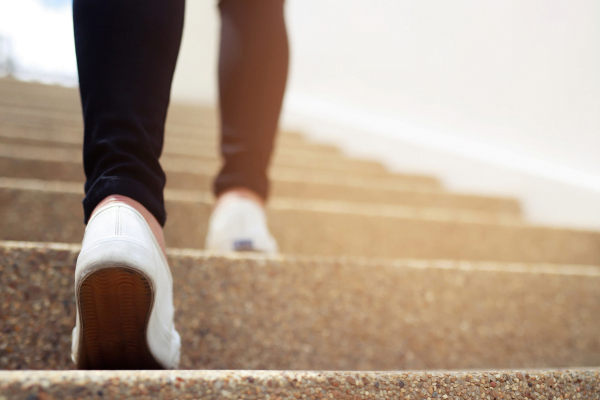Walking is good for our health and we all are aware of this.
No matter if you are into weight management, fitness, workout, or just want to be healthy. In this modern era, we are using either mobile or smart watches to monitor our step counts with the help of a pedometer.
Have you ever been told that walking 10,000 steps a day is the key to staying healthy? Is this true?
Is it really as important as people say? Achieving 10,000 steps a day is something everyone needs to do or is it not required?
In this blog, we will help you understand whether hitting the 10,000 steps as a goal is right for you or not. So, get ready to learn more about walking and staying healthy!
Do you know the 10k steps rule?
The 10,000 steps per day were first introduced in Japan in the 1960s with the release of a pedometer called “Manpo-kei,” known as “10,000 steps metre. Since then, it has been widely adopted as a standard recommendation for daily physical activity.
Achieving 10,000 steps a day can be beneficial for many people, however, it is not a one-size-fits-all solution. The actual amount of physical activity needed varies from person to person based on factors like age, weight, fitness level, and overall health goal.
Walking is a good start for a healthy lifestyle, however, you do not need to worry about your step counts. Some people might be fast walkers and some are slow. Not only is this, as mentioned above there are many factors which affect step counts but, it does not matter.
Marie and Marios are twins. They are both of same height and weight. However, Marie put on some weight and to encourage her, Marios joined her for a walk. Do you think they both achieve the same step counts?
Not exactly, but it is somehow similar. They both walked for the same distance and time but Marie lost more calories than Marios. Do you know why? The more the person weighs, the more they burn calories, also it depends on the person’s metabolism. In other ways the person who has more muscle will burn more calories. So, you do not need to worry about your step counts, just focus on being active.
No need to achieve 10k steps regularly!
Yes, we do not need to achieve 10k steps regularly though our fitness trackers may advise us to walk 10,000 steps a day. You may hear this advice frequently too. However, it is important to remember that this is not always the best course of action.
You are free to set your speed and take your time increasing your present steps. The good news is that walking 7,000–8,000 steps a day is just as good.
As mentioned above, whether hitting the 10k step is good for you or not depends on your unique health requirements. If someone is physically fit they can easily achieve more than 10k regularly but it does not suit everyone.
For example, if someone has osteoporosis, sarcopaenia, weight related issues or any other condition, it is good to start walking to improve their health but they do not need to achieve 10k steps regularly. Even if they achieve 10k steps eventually they will give up due to health issues. Instead, they can gradually increase their step count according to their health.
Apart from this, to achieve a healthy lifestyle one has to improve healthy eating practices by including protein-rich food, fruits and vegetables to nourish their body, to improve mindful practice by doing yoga and meditation to reduce stress and improve mental health. Also, they have to do strength training along with aerobic exercise to build muscle mass and to improve body flexibility.
Even though you go for a walk regularly or achieve 10k steps regularly it is important to do a strength training regimen. At least 2 hours 30 mins a week on alternative days with moderate level exercise would be beneficial along with walking.
Setting objectives can motivate you to improve, but it is important to remember that reaching a goal is not always required. Walking keeps you in shape and can be incorporated into a workout schedule, and you do not need to worry if you lack 10,000 steps a day.
So always move mindfully and make sure it is part of your day-to-day routine, keep it fun and set realistic goals to avoid disappointment and be grateful for yourself.
Health benefits of walking
- It enhances lung health and respiratory function.
- It may effectively decrease the chance of heart problems.
- It aids in the management of diseases including weight management, hypertension and diabetes.
- It enhances bodily equilibrium and strengthens your bones.
- It can reduce stiffness and joint pain.
- It improves mental health, especially by preventing or reducing the risk of dementia and other mental diseases.
- It strengthens the immune system.
- It promotes lean muscle mass and burns body fat.
Things to remember while walking
- Wearing a pedometer while walking allows you to establish goals and monitor how many steps you take.
- Make sure your walking intensity is comfortable.
- Always start slowly, stop when needed, and cool down after walks.
- When going for walks, do not forget to dress comfortably and wear appropriate footwear.
- Make your strolls engaging.
- Always select walks based on your level of health and keep it fun.
- When going on walks, make it a point to stay hydrated by drinking.
- Go for a walk with a partner who loves to do physical activity. They will be a good companion and encourage you in the long run.
Conclusion
Overall walking has been shown to enhance quality of life by promoting energy, enhancing sleep, enhancing mood, and preventing mental illness.
It is advisable to walk for a purpose; this could be as simple as needing a break or for weight control, health issues, or emotional well-being.
To get rid of a sedentary lifestyle it is good to start with a walk. Achieving 10,000 steps is great. However, please remember step counts do not matter, going for a walk regularly with the achievable step count target is important.
To enjoy the rewards of excellent health, set achievable goals and raise them gradually. Also, make sure to follow healthy eating practices, and do strength training along with aerobic exercises and mindful practice.
Varsha and Felciya,
Clinical Dietitians, Simpyweight





